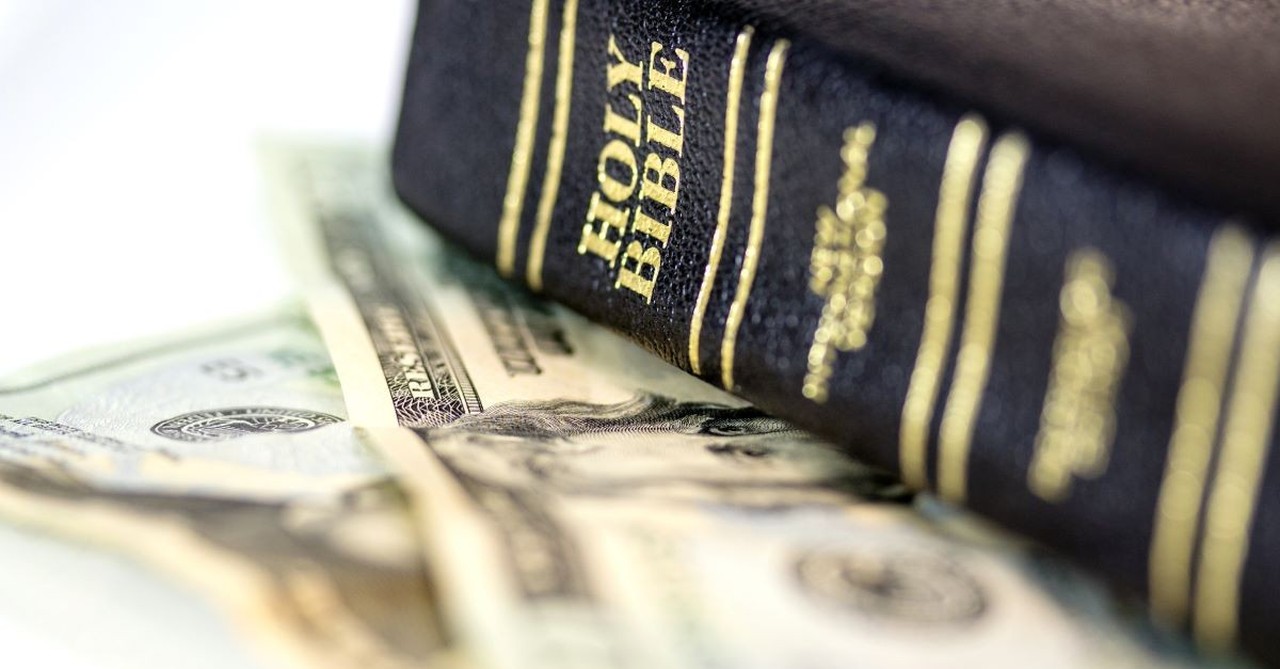Is There a Christian Way to Buy a House?

Editor's Note: Pastor Roger Barrier's "Ask Roger" column regularly appears at Preach It, Teach It. Dr. Barrier put nearly 40 years of experience in the pastorate to work answering questions of doctrine or practice for laypeople, or giving advice on church leadership issues. Roger went to be with the Lord in February of 2024; read about his faith-filled legacy here.
Dear Roger,
My husband and I are planning to buy a house. Are there biblical guidelines for house buying? If so, could you please share them with us?
Sincerely, Kimberly and Don
Photo courtesy: ©Christopher Harris
Money and the Bible

Money and the Bible
SLIDE 1 OF 7
Dear Kimberly and Don,
When I began studying the subject of the Bible and houses, I was surprised to see that the Bible has a lot to say about the subject. Let me give you an example.
By following good biblical economics, God has kept his financial promises to us and we have never lacked for anything.
Our first daughter, Jesse, was born to die. Her chromosome confusion doomed her to an early grave. Forty days in the neonatal section of the hospital, plus all the attending doctors, tests, and medicines produced an astronomical financial bill. Fortunately, we had medical insurance which paid for everything except for $11,000.
We didn’t have $11,000. We didn’t have anything. It was my first year pastoring in Tucson and finances were tight. (In fact, the church agreed to pay me a salary of $1,000 per month. However, when we arrived, the head deacon told me that they had changed their minds and could only afford $900 per month. I got a $100 cut in salary before I ever preached my first sermon.)
The night Jesse was born, our obstetrician, out of the goodness of his heart, cut his bill in half.
The church took up an offering and other friends and neighbors donated to help us reduce the debt. Then, a friend invited me to lunch at the local Village Inn Restaurant. After we were seated, he asked me how much more money we needed to completely pay off the debt. Frankly, I was embarrassed by his request. But he insisted. Finally I said, “We are still $1,800 short.”
He reached in his coat pocket, pulled out his checkbook and wrote a check to me for $1,800. I protested; I felt very uncomfortable taking his money. But he kept on insisting. Finally, with great gratitude of heart and many “thank yous,” I reached out and took the check. Then, he held open his checkbook and put it right to my face while saying, “If you have any more bills come in, they are mine.”
I knew then, and still believe, that because Julie and I were following God’s financial plan, He met our needs to the very dollar.
Let me share with you some things to keep in mind from a biblical perspective when you are thinking about purchasing a house.
Photo Credit: ©GettyImages/Enterline Design Services LLC
1. If we give God the top portion of our income, He will meet our financial needs.

1. If we give God the top portion of our income, He will meet our financial needs.
SLIDE 2 OF 7
The first portion of our income is called the “tithe” (10 percent) which is validated by Jesus in Luke 11:42.
I’m convinced that the reason many Christians struggle in financial bondage is because they refuse to follow this first step in a godly financial plan.
“Will a mere mortal rob God? Yet you rob me. But you ask, ‘How are we robbing you?’ In tithes and offerings. You are under a curse—your whole nation—because you are robbing me. Bring the whole tithe into the storehouse, that there may be food in my house, says the Lord Almighty, trust me in this and see if I will not throw open the floodgates of heaven and pour out so much blessing that there will not be room enough to store it.” (Malachi 3:8-10)
This is the only verse in the Bible where God invites us to trust Him. This is really important.
Photo Credit: ©GettyImages/MARIAMARTAGIMENEZ
2. Refuse to be seduced by materialism and status symbols.

2. Refuse to be seduced by materialism and status symbols.
SLIDE 3 OF 7
Psalm 49 is the Psalm of the rich materialist. God is warning us that if we’re awed by someone else’s house, envious of it, or attracted to it, we are in danger of falling into the trap of materialism.
The most universal, time-tested, status symbol in human history is the house. The house is not the only status symbol in society. Cars, clothes, jewelry, club memberships, and suntans would be a partial list of others.
It’s no surprise that when God wants to teach us the danger of seeking after status symbols in Psalm 49, He would use the house as an illustration.
God never teaches that a big house is proof that the occupants are materialists. After all, there are many very rich and righteous people in the Bible – like Abraham and Joseph.
The result of materialism and status seeking is often misery and despair (Ecclesiastes 2:4-11). This is especially true when we buy more house than we can afford.
“But godliness with contentment is great gain. For we brought nothing into the world, and we can take nothing out of it. But if we have food and clothing, we will be content with that. Those who want to get rich fall into temptation and a trap and into many foolish and harmful desires that plunge people into ruin and destruction. For the love of money is a root of all kinds of evil. Some people, eager for money, have wandered from the faith and pierced themselves with many griefs.” (1 Timothy 6: 6-10)
Photo Credit: ©GettyImages/GlobalStock
3. Houses aren't the priority that we think they are.

3. Houses aren't the priority that we think they are.
SLIDE 4 OF 7
Paul defined contentment in 1 Timothy 6:8: “If we have food and clothes we will be content with that.” There is no mention of houses.
There are entire cultures in our world where practically no one owns a house. In many countries, four or five families live in a house smaller than one American house. I’ve seen it.
Photo Credit: ©Getty Images/trumzz
4. Begin your financial planning on the basis of your financial resources, not your desires.

4. Begin your financial planning on the basis of your financial resources, not your desires.
SLIDE 5 OF 7
Don’t ask: “What do I want? What does the world say that I should have? What does my peer group say that I should have? What is fashionable?”
Instead, ask these questions: “What resources do we have? What can I do with the resources that I have? What buying power do I have? What earning power do I have? How does God want me to use it?”
“Keep your lives free from the love of money and be content with what you have, because God has said, “Never will I leave you; never will I forsake you.” (Hebrews 13:5)
“Keep your lives free from the love of money...” These are our desires. Stop thinking materialistically.
“And be content with what you have...” These are our resources.
“Because God has said, ‘Never will I leave you, never will I forsake you.’”
God says, “I will give to you the right amount of resources; you will use these according to my will. It is that simple. You be content with what I have given to you.”
When we take this approach, we allocate our resources rather than attempt to pay for our desires. If we go through life attempting to pay for our desires, we will ultimately crash and burn.
5. How much money can I spend on a house?

5. How much money can I spend on a house?
SLIDE 6 OF 7
Let me give to you a rule of thumb used by most financial planners to give you an idea of an approximate amount that you can afford to spend on your house.
The average realtor will examine your annual salary and say that you can safely spend 30 to 35 percent of your annual income on a mortgage for your house. In some cases, it’s possible to go as high as 40 percent. But that’s pushing it.
The only problem is that your realtor has not factored in God. Getting our fields ready means that we take a closer look at how much we are really going to need.
Let me share with you some of the things to keep in mind from a biblical perspective when you are thinking about purchasing a house.
Most Christian financial planners work with a term called “Net Spendable Income.”
Take your gross income per month and subtract three things from it. God’s part, the government’s part, and savings... What is left we can define as our Net Spendable Income.
For simplicity’s sake, let’s illustrate and use 33 percent. Let’s say your gross income is $36,000 per year, or $3,000 per month.
God’s part =10 percent or $300. Leaving $2,700.
Government’s part = 20 percent or $600. Leaving $2,100.
Savings = $300. Leaving $1,800.
$1,800 x 33 percent = $600 per month to spend on housing if you make $36,000 per year.
Let’s not forget that many families struggle by with an income of $36,000 per year or less.
Now, let’s go to a higher figure and say that your gross income per year is $120,000, or $10,000 per month.
God’s part = 10 percent or $1,000. Leaving $9,000.
Government’s part = 30 percent or $3,000. Leaving $6,000.
Savings = 10 percent or $1,000. Leaving $5,000.
$5,000 x 33 percent = $1,650 per month to spend on housing if you make $120,000 per year.
Of course, we recognize that we may not have much of a house by following this rule. But by following this rule, we remain faithful to the principle of allocating resources rather than trying to pay for our desires. In this way, we have a financial plan that is designed by God for solid success.
If we go out and find the house we desire and then try to pay for it, we are going to fail. We have to allocate resources.
Is it alright to have a mortgage? The Bible teaches that it is alright to borrow money on an appreciating asset. It is not alright to go into debt for depreciating items like cars and refrigerators. A house can be a great asset and a marvelous investment. But remember, houses can go up and down in value.
There are many scenarios in today’s economy where renting a house is a much wiser decision than buying a house.
And we are not throwing our money away by renting.
We are getting value received when we rent. We are getting a place to live and we get the total flexibility to walk out of it clean at any time without a mortgage hanging around our necks. We are free of the worry of maintenance, insurance, and taxes.
And, we have gotten rid of the risk that the property will go down in value.
Biblical economics helps us to reach healthy financial goals.
Photo courtesy: ©GettyImages/monkeybusinessimages
6. Proverbs 24:27 provides the guideline which prepares us to buy a house:

6. Proverbs 24:27 provides the guideline which prepares us to buy a house:
SLIDE 7 OF 7
“Finish your outdoor work and get your fields ready; after that, build your house.”
Let me show you what, “finishing our outdoor work and getting our fields ready,” involves. Only when the work is done and the fields are ready is it time to buy a house.
1. We are paying the Lord His proper share of our income.
2. We are paying the government taxes according to the law.
3. We are out of debt for all depreciating items.
4. We are saving a portion of our income for the future.
This includes an emergency fund that is set aside to cover our unpredictable (as well as predictable) future needs. Many economists say that our emergency fund should be somewhere between three to six times our monthly gross income.
5. We have a positive cash flow.
A positive cash flow means that we are taking in every month more money than we are spending. Every month we pay all our bills and there is something left.
If we will follow these principles, then we will discover that we are biblically allocating our resources rather than having to pay for our desires.
I am convinced that if we begin to commit ourselves to follow God’s biblical principles we will be delighted to see that God just might start doing some things that we could never do with the resources that we have.
May God bless you, Kimberly and Don, with great wisdom as you make one of the biggest financial decisions of your lives. May God make His will so clear to you that you can’t miss it.
Sincerely, Ask Roger
Photo courtesy: ©shironosov
Originally published March 15, 2024.









